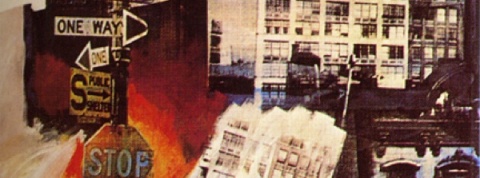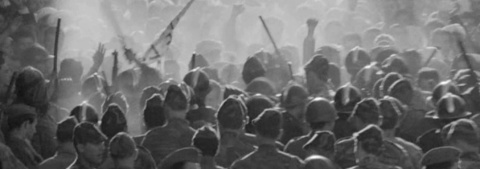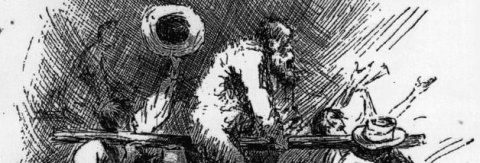Literary glances
Ridin’ the Rail: On the Ending of Huckleberry Finn
The novel can be explained by a long tradition. Its shallow characters, the satiric cast, the episodic nature of the plot—all of these elements are consistent with the picaresque novel, and Don Quixote is often alluded to, probably an influence. But I still want a principle that explains the logic of its design. I would argue that it is the expectation of a well-made novel set against its absence that determines Huck Finn‘s construction and sets the tone. It is the ghost of rising climax, hovering everywhere, that gives the novel its form and tension. I also prefer to think of it as a novel looking forward to modern forms and to our condition, the fog of the last hundred years.
Appeared in Numéro Cinq, Vol. II, No. 2, February 2011
The View from the Masthead: Melville / Moby Dick
If these editors have their say—and they have—this is my greatest regret about writing today, that we can’t have anxious, half-mad, much less fully mad, novels. For me it is enough cause to write one.
Appeared in Numéro Cinq, Vol. 1, No. 3, April 2010
Complexity: Don Delillo / Players

Keep the complexity of the old scheme, but remove the focal point, and we’re in the world DeLillo has created in Players. Demons and angels, the abodes of heaven and hell, have been replaced by those on the inside, who have the power, and those outside, who do not. It is not clear, however, what is right or wrong in this world, or who is good or bad. Even the Marxist distinction between oppressed and oppressor has been blurred. There are revolutionaries in the novel, but it’s not clear they have a better claim to the world or are better motivated, much less have a plan to save it. You’re better off materially on the inside, but that’s about it.
Borges / “The Library of Babel”
Thoughts

Borges’ “The Library of Babel” is not some clever puzzle like an Escher print, but a genuine enigma, beyond explanation or solution. A better representation might be Piranesi’s carceri—vast, dark prisons, seemingly endless, whose laws, whose systems, whose punishments are not articulated and probably are not known by those who wander through them, which may not even exist. Borges’ Library is a vast construction, possibly infinite, of seemingly endless books that may not make any sense. Each cell in the Library is lit by two lamps; “The light they emit is insufficient, incessant.” Librarians have to sleep standing up.
Our existence is reduced to nearly nothing by the enormity of our containers.
Construction

“The Library of Babel” is a story because Borges tells us it is a story—what further reason do we need?—and he constructs it the way he does because, to an overwhelming extent, the setting is the story. There is no other way to write it that would be as effective, really no other way.
Point of View: Max Frisch / Man in the Holocene
We would like to think that the distance that separates us can be closed, that tensions can be eased, that we agree about something, that conflicts find resolution, or, failing all these, that we might at least learn something from the broil. The evidence from Holocene and most recent fiction has been less than favorable, however. Certainties are discovered, but these certainties do not add up to much or tell us what we want to know. Still we are reluctant to give up these desires, and if we can’t fulfill them, we still try, those of us who write fiction, to find ways to contain our disappointment.
Appeared in Numéro Cinq, Vol. I, No. 7, August 2010
Updike / “The Blessed Man of Boston”

The temptation is to label these as “experiments,” interesting diversions, artificial sidetracks from his mainstream work. I would make the opposite argument, that the traditional stories are more artificial, and that the experiments are more successful at doing what fiction is supposed to do, come to terms with our experience in the world, find a way to contain it, and do so with what should the criteria for any work of art, a form appropriate for the content.
Tom Wolfe / The Bonfire of the Vanities

Our culture wasn’t touched, we kept barreling ahead, blindly, and now the book is largely forgotten. But also, as I will argue, Bonfire didn’t give us much to think about. And his esthetic itself wasn’t an advance but a retreat into tired, unexamined ideas about fiction. It also dovetailed nicely into a commercial publishing world whose primary critical stance is to promote whatever moves the reader through pages and books off the shelves.
George Konrád / The Caseworker

The narrator’s time with the child is anything but uplifting. The boy lives a near animal existence, cannot respond to the caseworker’s attempts to care for him, has no hope to recover, and the few moments of warmth are fleeting. The rest is filth, anger, and frustration—yet not despair. The narrator claims no high ideals to justify his behavior. One day he has the child on his hands, no other options are available, and there isn’t anything else he can do. As the caseworker says, staying with the child, “would not, I think, be a more stupid or superfluous existence than the one I have behind me.”
Gillo Pontecorvo / The Battle of Algiers

The Battle of Algiers, directed by Gillo Pontecorvo, is a tremendously well made film, balanced, understated, and objective, yet moving and convincing in every detail, every scene. It should be seen for the quality of its esthetic alone. That said, it is also a lesson in observation and human understanding. Compare it with the productions cable news fed us on the Iraq war and the stories told by our military and political leaders—their forced sentiment, their blindness, their wrenching of the plot—yet they were stories too many of us wanted to believe.
We all pay a price for bad art.
Modern American Painting

But the painting resists being reduced to interpretation or filed away as some kind of historical illustration. The disruption of wind and water rendered by rough strokes, the slashing diagonals, the touches of red, suggestive but unexplained—all create images and a motion in a picture that cannot rest or be put aside.
We cannot gloss disturbance over or pretend it isn’t there.
A Tribute to James Fenimore Cooper, A Literary Romance

What a solid block of prose. It just impresses with its heft, its bulk, with what looks to be moral fiber. It is the kind of prose that can keep a country regular. One of these days I will have to read it.



